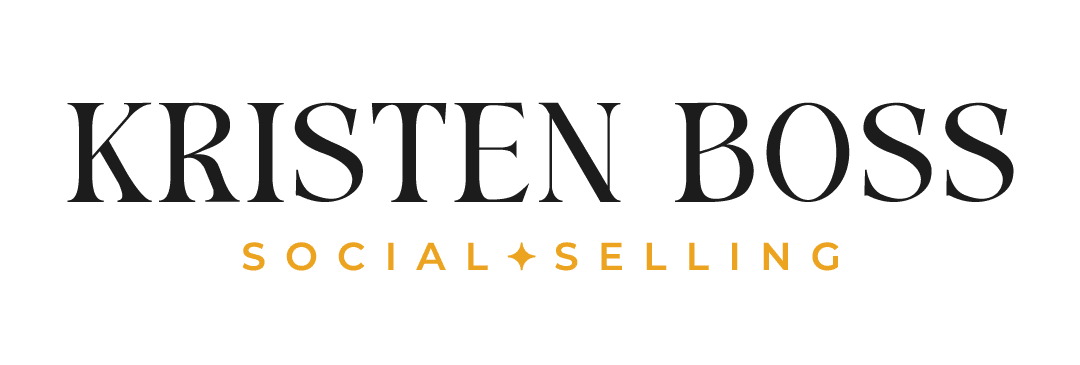You may be a goal setting pro who never reaches their goal. Or maybe you don’t even know where to start when thinking about setting a goal. Today, Kristen is going to help clean up any drama that you may have around setting and working towards a goal. Because if you don’t have a healthy relationship with setting goals, you will avoid setting them altogether. And that means no growth in your business or yourself.
Here are a few highlights:
- What happens when you write down your goal and make it specific
- How to know how to set your goal parameters and timeline
- How to avoid hustle when working towards your goal
- What to do when you find yourself in drama while working on your goal
- The questions to ask yourself if you don’t hit your goal
- Why you must see failure as a necessary milestone
There’s a big difference between a “goal setter” and a “goal getter.” A goal getter takes action and learns about themselves in the process. Because the true result of setting a goal is what you reveal about yourself and how you learn from that along the way. It’s so much more than hitting a milestone! Listen now for more.
Thanks for listening! If you’re ready for high-level coaching and teaching in your network marketing business, check out Kristen’s exclusive Mastermind for six-figure earners in the network marketing industry. Get all the details about the Purpose & Profit 6-Figure Mastermind and join the waitlist here.
Connect with Kristen:
If you’re ready to learn the simple process of running your social selling business online, you have to check out Kristen’s live group coaching program! The Social Selling Academy: www.thesocialsellingacademy.com
Do you have a business full of customers and almost no builders? You’re in need of a reboot! Learn the three skills you can learn that will completely change your recruitment game. Check it out here.
Transcript for Episode #118 Goal Drama
Kristen Boss (00:05):
Welcome to purposeful social selling with Kristen boss. I’m your host, Kristen boss. I’m a mindset and business coach with more than 15 years experience in both the product and service based industry. I believe that social selling is the best business model for people wanting to make an impact while they make serious income. This is the podcast for the social seller, who is tired of feeling and authentic in their business and desires to find a more purposeful and profitable way of growing their business. In today’s social media landscape. In this podcast, you will learn what it takes to grow a sustainable business through impactful and social marketing. It’s time to ditch the hustle and lead from the heart. Let me show you the new way.
Kristen Boss (00:48):
Hey bosses, welcome to another episode of the podcast this week. I wanna talk to you about the concept of goal drama, setting goals, how to set them well, and the mindset you need to have about goals, period, because some of you, you understand the mechanics of goal setting. You get it. Maybe you’ve heard the acronym smart, you know, setting smart goals, small measurable, attainable, realistic, and time bound. Maybe you have heard the acronym before. Maybe you have been like, okay, so how do I pick a goal? What do I just pick this random arbitrary nor number, you know, sales goal by a certain period of time. And here’s what I wanna offer you. I wanna clean up any unnecessary drama that you may have about goals in period and help you have a more positive relationship with goals in general, because if you don’t have a healthy relationship with setting a goal, you’re going to find yourself avoiding setting goals.
Kristen Boss (01:47):
And maybe some of you are there. You’re like, well, I kind of just stick with processes and habits and Hey, those are great, but actually setting for yourself a measurable goal in the future that you are committed to working towards no matter what. So a lot of times people think when they’re setting a goal, they think the whole thing, the whole reason for setting a goal is to achieve the goal. Like people are like, well, why do you set goals? I mean, I’d be curious, ask yourself, why do I think we should set goals? Why set a goal? And a lot of people will be like, well, to reach, to accomplish the goal. But I’m gonna argue that setting a goal is not really about accomplishing something. Now, people, it is statistically proven and researched that people who write down their goals see more success than those who do not write down their goals.
Kristen Boss (02:44):
But it’s more than just writing down a goal. It’s more than just visualizing a goal. It’s actually committing to a goal and deciding on the goal. But really what I wanna do is I wanna help your mindset around goal setting in general, before we even get to, to the mechanics of goal setting. So the mindset of a goal, a lot of people think well it’s so that I can let’s do for an example, you want to, you know, increase your earnings by 20% in the next 90 days, that’s very specific. You’re giving a time to it. And you’re saying, I want to see the goal is to see a 20% increase in my sales in the next 90 days. Now you might be thinking this goal, you writing down this goal, the whole reason you’re setting it is so you can achieve it. But in actuality, the goal is a lot more than that in your setting of the goal.
Kristen Boss (03:35):
What it does is as soon as you write down, I want to create 20% more sales in the next 90 days. What that does is now suddenly you are giving your brain direction to problem solve. Now we’re coming up with solutions. Now we’re coming up with creativity. Now we’re innovating. Now we’re kind of brainstorming in a way that you weren’t able to brainstorm before when you were just telling yourself, oh, I want to increase my sales. Well that doesn’t give your brain a lot to go on. You need to be as specific as possible so that you can put your brain to work and start problem solving for a specific problem. Again, it’s hard to solve a problem if you don’t know what the problem is, you can’t be vague about it. You need to be specific. So it helps give direction, helps give clarity.
Kristen Boss (04:20):
It helps creativity and it helps you innovate. Then it helps you formulate a plan, a very specific plan. And here’s the thing with the goal. If you’re like, well, how, how would I know what to pick? And then what timeline goal setting is really just hypothesizing. What you are doing is you’re taking an educated guess at how much energy and time it will take to acquire the said goal. Think about that again. You’re guesstimating, the amount of energy and effort. It will take you to reach the goal. And what you were doing is it informs you of your intensity and your speed and your consistency with the timeline. So let’s say, if you were to say, I wanna increase my sales by 20% in the next 90 days, your plan is gonna look different. Your problem solving is gonna look different. Then if you were to say, I wanna increase my sales by 20% in the next six months, your plan is going to look different.
Kristen Boss (05:19):
Now, what I want to say is I don’t want you to get caught up in oh, Kristen, but isn’t that really Huy to, you know, assign a goal in a short period of time. It’s not, if you aren’t feeling SC, scarce, desperate, and needy and attached to the goal, right? It’s learning to work towards the goal, but holding it loosely, like your emotional attachment to the goal, you have to hold that loosely. But your commitment to the goal, you still have to keep that intense and committed. It’s this really fine line. It’s this balance. You have to be able to hold your intensity for the goal. Hold your commitment towards the goal. While also letting go of your emotional attachment of the goal. It’s kind of an interesting thing to think about, but a lot of people they’re like, I don’t know how to do that.
Kristen Boss (06:09):
A lot of people are so afraid of emotional attachment with goal setting. They’re so afraid of disappointment that they just don’t set goals or they make it am ambiguous. They’re just kinda like, well, just somewhere down the road, somewhere down the line in the future one day, instead of however, when you put a timeline, now it informs the speed, the intensity and the required action you will need to do in that window of time. So then you create your plan and then in the exit. So you have the plan right now, we have the plan. And then there is the execution of the plan. And that typically is where all of your drama and all of your stories will come up. Some of you will have drama in the goal setting because you’ll start telling yourself, well, what if I don’t meet the goal? What if I fail?
Kristen Boss (06:52):
What if I go all in? And I don’t reach the goal. This tells me you don’t have the right mindset about, around the purpose of a goal. And we’re gonna clear that up. The purpose of a goal is less about the attaining of the goal and more about all the lessons you learn in your pursuit of the goal. It’s you are going to learn. If you do get, if you do hit the goal in your guesstimated time and effort, you know, if you hit the goal at your first guess what that tells you is like, okay, so my estimated guess with the time and the energy it’s gonna take to get to that goal, I was right. And if you don’t hit the goal, you’re gonna say, okay, so it’s taking more time and energy. Then I had first guessed. And so now I’m gonna put in more time and more energy, and you’re gonna assess your progress when you get to the goal and the deadline and you don’t meet it, you’re going to assess your progress and then ask yourself, okay, what is the plan to closing the gap of what’s left of this goal?
Kristen Boss (07:51):
What does my time and effort and energy need to look like in order to ensure this goal happens? And you’re going to extend the timeline, not from a place of complacency, not from a place of laziness. Notice how, like you went, the, the process I’m describing here is you said, okay, I’m gonna give myself 90 days. And you go all in for 90 days and you hit the 90 day mark, and you say, okay, I didn’t make it. I’m still, I’m still short of the goal. I underestimated how much effort it was gonna take to do a, B and C. I underestimated how much time it took me to do a, B and C. So now in order for me to close that gap, I’m gonna extend my timeline by another 45 days. And I think I can close it in 45 days. And here’s the plan I’m gonna create in order to ensure this happens in the next 45 days.
Kristen Boss (08:36):
Notice how different that is from setting the goal for 90 days and getting to day 30 day 45 and telling yourself in the middle of it. I don’t see this working. I don’t see how this is gonna happen. There’s a lot of things not going in my favor. I don’t think this is gonna work out for me. Uh, you know what? I’m just gonna push out the timeline a little bit more. I’m gonna, you know, maybe I need to add a month. And what that does is it kind of moves you into a position of like your it’s like a micro quit. You’re starting to negotiate with yourself and you drop your healthy sense of commitment and urging urgency to your timeline. And what you do is you end up dropping your intensity because you just told yourself, well, it’s okay if I don’t make it in the 90 days, I’ll just keep pushing it out.
Kristen Boss (09:21):
And then what do you think is gonna happen when you get to the next timeline? Well, as you get close, you’re gonna start judging your progress or lack thereof and say, Ooh, I think I might need to push this out even more. Instead of I’m going to hold to the timeline, no matter what, and here’s the thing. You’re not gonna let yourself do that. If you’re telling yourself, oh my gosh, I suck at setting goals because I didn’t accomplish the goal. I’m not good at this. I can’t do this. I should stop setting goals and feeling all kinds of shame around, not hitting the goal. Noting the goal means nothing about you as a person or your worth or your capability or your skill set. It just means you underestimated the time, energy, and effort that it would take to acquire that goal. And so then you adjust, you don’t give up, you just adjust, right?
Kristen Boss (10:10):
This is why it’s so important that your mindset around the goal itself is in the right place. Because if you make setting a goal only about hitting the goal, meaning the goal and accomplishing it and you don’t do it, then you think it’s a pass, fail, like goal setting. It’s a pass, fail relationship. You either pass or you fail. And if you fail, you are a failure instead of, okay, I’m gonna adjust and I’m gonna keep going. You’re going to learn so much about yourself and setting a goal. I say this in my 90 day goal, getting challenge. I’m like, listen, goals always expose your stories. That’s why they’re uncomfortable. Not just like when you’re choosing your goal, definitely that’ll expose some of your stories. Some of you might think I’m not worthy of that goal. Or, um, you might have stories about why that goal’s not already possible before you even set the goal.
Kristen Boss (11:01):
You’re gonna be like, you just decide before we even set the goal. It’s not possible. And if you haven’t listened to my, um, impossible goals podcast, I would highly recommend you go back to that episode about moving from impossible goals to possible, to inevitable. But some of you, when you’re sitting down to set a goal, you evaluate if it’s even possible from the beginning and you’re like, Nope, not even possible. So I’m not gonna go for it. Right? So how you set the goal is really important. You can’t view it as a pass fail, and also your stories are gonna come up when you’re setting the goal, you’re gonna be like, okay, here’s all my stories coming up about deciding what I want my goal to be it’s too much money, or what will people think of me or all those other stories that come up.
Kristen Boss (11:46):
So you’re gonna notice stories in the goal setting. And then you’re gonna notice a whole new set of stories in the goal. Getting, there are plenty of people out there that set goals or write down a goal and then proceed to do nothing. Because once it starts with the execution and the implementation, that’s when all the discomfort starts really piling up. That’s when suddenly when there’s a road bump and there’s a setback, there’s disappointment. There’s a failure. It’s really easy for people to be like, guess it’s not happening today. And they give up and I say, this goal’s not possible now. Cause I had a bad week and they’re, they’re not problem solving for like, okay. So I had these setbacks, how might this goal still be possible? And what do I need to adjust in my thoughts and my actions and in my behavior in order to still make this goal happen, your goals are your greatest teacher.
Kristen Boss (12:35):
If you wanna learn something about yourself, if you wanna change your relationship with yourself, set a goal and tell yourself that you are not allowed to give up on the goal and notice how many stories come up for you in your pursuit of the goal. I was listening to this, um, uh, what is the word I’m looking for this audio book? I was listening to this audio book, um, with Dan Sullivan, the gap in the game. It’s a great book. I can’t recommend it enough. And what he was talking about, he was saying that goals are, are education, like goals educate far more than they, you know, are about actually getting the goal, acquiring the goal and accomplishing he’s like it’s our greatest education is our pursuit of the goal. It’s learning things about ourselves, learning things about others, our relationship with ourself, how we show up all the stories we have, our goals always educate us.
Kristen Boss (13:37):
This is why I teach the goal getter challenge inside the academy. Because a lot of people, they think they know how to set goals. They think they know how to go, go for goals. But when it comes to the mechanics, when it comes to the commitment, when it comes to the mindset and the stories in the pursuit of the goal that is when most people check out, when most people say, I don’t think I can do this, this isn’t for me. Or they stop setting goals. It’s in the goal getting I think, and I said this in my book, pivot to purpose. I said, you know, our brands are wire wired to goal set. We as humans, we, you know, ask anybody, they’d be like, you know, Hey, what do you want in your future? What do you want in your goals? What’s next for you?
Kristen Boss (14:17):
A lot of people might tell you goals. They have, but it’s a completely different skill set to be somebody who gets goals, being a goal, getter, a goal setter. Anybody can do. You can write down your intentions. You can write down your vision board. You can write down what you want for your future. But what separates the dreamers from the doers is doing is the action is the people who actually see their dreams come, come to fruition. Are the people that went out and said, okay, I’m gonna push through all the resistance, all the hard, all the stories in my pursuit of this goal. And if, when I don’t hit the goal in the set amount of time, I’m not gonna give up on the goal. I’m just going to adjust the timeline. I’m gonna dig a little bit deeper on these stories and I’m gonna keep going because it’s that important to me.
Kristen Boss (15:04):
So here’s what I wanna offer you today. Maybe you set a goal at the beginning of this year. Maybe you set a goal at the beginning of quarter three, and you told yourself you had this picture of how you thought it was going to look pursuing a goal. And I think sometimes we really, in our mind, I really think we romanticize what, uh, going for a goal is gonna feel like, and look like, you know, for example, I always picture myself waking up super early and I’m like, oh, it’s so great. And I have this romanticized idea of what it’s gonna be like, but in the morning it feels terrible. I’m like, oh, somebody make this alarm stop. I can’t stand this. I don’t want this. Right. We romanticize what we think pursuing success looks like we think it’s gonna be all fun and games, but it’s actually quite hard.
Kristen Boss (15:47):
It’s hard. Mostly because of all the stories that get in our way, it’s hard because we’re seeing parts of ourselves that we don’t like seeing, listen, you wanna find, find all of your weak spots, set a goal and pursue it. You’re gonna find out, find all of your weaknesses. It’s all gonna surface, but weaknesses doesn’t make you wrong. Listen, you can develop those. You can strengthen your skills. You can get better at these things. You don’t have to decide. I’m just bad at goals. And therefore I’m never gonna do it again. You can just decide, okay, there’s some skill sets I’m gonna have to get better at in order to be somebody who goes after their goals, pursues the goals and sticks with it until they acquire the goal. But most people don’t have that mindset because they’re in a pass, fail relationship with a goal.
Kristen Boss (16:34):
I either I set the deadline and I either pass or I fail. And based on how it goes, I’m gonna make a judgment on myself and I’m gonna make a judgment on my capability of my future. Cause a lot of people, they won’t hit a goal and they’ll make that mean something about their future. They’ll make it mean there’s no way I’m gonna be able to hit that. Marker hit that milestone because look at these other times when I didn’t hit these markers or milestones, instead of I’m willing to keep failing until I get it right. Think about the most successful people and our IVA innovators out there. There are people that literally have a positive relationship with failure. They don’t see it as like, uh, the ultimate, you know, stop or a roadblock. They’re like, okay, we’re just gonna keep going. This is a necessary milestone to the win.
Kristen Boss (17:21):
Are you willing to see failures as a necessary milestone in your journey? Are you willing to say, okay, that was fail. Number one, we’re gonna keep going. That was fail. Number two. We’re gonna keep going. Just because you fail doesn’t mean you are a failure as a human, but I see a lot of people do this when they fail. They think I failed. Therefore I am a failure. No, you’re just a human who sometimes doesn’t make the goals. Sometimes doesn’t, you know, meet the cut and that’s okay. That’s okay. So work on this relationship with goal setting and understand, change your mindset around the goal. I want you to tell yourself because likely you have a goal right now, or maybe you don’t have a good relationship with goal setting and you need to set one today. The only way you will feel safe, setting a goal is if you stop making it a pass fail relationship.
Kristen Boss (18:13):
And if you stop making, not hitting the goal means something about you personally, as a human that’s. The only reason why we stop setting goals is because we make missing. The goal means something that is inherently wrong with us or that we don’t have capability or the skill and that someone other people must have something we don’t. And the only thing they might have that you don’t is a lot more grit, that’s it? But you can decide to have the grit. You can decide I’m gonna be gritty and resilient and persistent until I hit this goal. Anybody is capable of grit. Anybody is capable of deciding to be a persistent human being. I mean, goodness, my five year old daughter is the most persistent person. And I, I love that about her, but man, it makes her a challenging toddler because when she sees what she wants, she’s the most human <laugh> and she drives a hard bargain and I’m like, okay, this is a really amazing, valuable trait in her personality that I never want to squander.
Kristen Boss (19:23):
I’m just gonna help direct it. So take a note. If you are a parent, take a, take a page from your kid’s book today, be persistent and stubborn with what you want. Don’t take no for an answer. Now I’m not talking about from people <laugh> like, I’m not talking about, you know, bullying people to buy from you and being like, I don’t take no for an answer. You need to buy from me. I’m not talking about that. Don’t take no for an answer from yourself. What if you never took no for an answer from yourself when it came, pursuing your goals and doing the hard thing and staying committed and going all in, what would that look like for you today? So I would encourage you stay committed to whatever goal you set today. And then when you get to the deadline, then you reevaluate and decide how much more time and effort and energy do I think is required to close this gap. And then I’m gonna hold to that goal. And I’m just gonna keep going. When you learn to view goals differently, you are going to change your relationship with your business, your relationship with yourself and your relationship with goals and friends that is work worth doing catching. The next episode,
Kristen Boss (20:32):
That wraps up today’s episode. Hey, if you love today’s show, I would love for you to take a minute and give a rating with the review. If you desire to elevate the social selling industry, that means we need more people listening to this message so that they can know it can be done a different way. And if you are ready to join me, it’s time for you to step into the social selling academy, where I give you all the tools, training, and support to help you realize your goals in the academy. You get weekly live coaching so that you are never lost or stuck in confusion. Whether you are new in the business or have been in the industry for a while. This is the premier coaching program for the modern network marketer go to www.thesocialsellingacademy.com to learn more.










